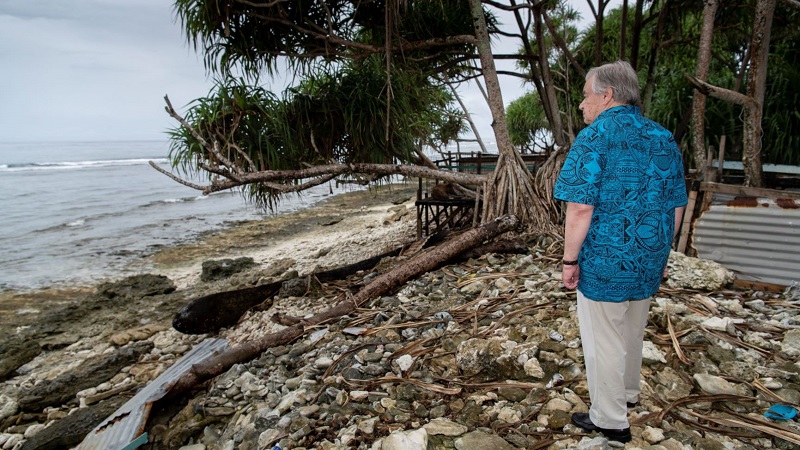It’s been a week of contrasts in climate action.
The UK and France set in law the boldest carbon-cutting commitments of any major economy to date. At Friday’s ministerial on climate action, co-conveners from the EU, China and Canada had warm words on raising ambition.
Saudi Arabia, on the other hand, was busy sabotaging science-based diplomacy. G20 host Japan steered leaders towards a weak statement on the Paris Agreement, seemingly to keep the US sweet. Russia’s Vladimir Putin trolled liberalists, declaring their value system “obsolete”.
Enter Antonio Guterres, the UN chief determined to tackle the climate crisis and defend his institution’s mission from unprecedented challenges. Can his September climate summit salvage the spirit of Paris? Ahead of a key sherpa meeting on Sunday, Chloé Farand examines the Portuguese diplomat’s quest.
Science sidelined
Saudi Arabia succeeded in burying the UN’s special report on 1.5C warming, as interim climate talks wrapped up in Bonn, to the outrage of vulnerable countries.
Civil society observers lodged a formal complaint against one Saudi negotiator for “bullying” a female co-facilitator of the discussion, in a sign of how high tensions ran – and a test of UN Climate Change’s “zero tolerance” policy. The secretariat’s Ovais Sarmad told Climate Home News they were working to establish the facts of the incident and taking legal advice.
Not to be left out, former Saudi climate envoy Mohammad Al-Sabban went full-on science denier in editor Karl Mathiesen’s Twitter feed. RIP his mentions.
Carbon loopholes
The scene is set for a showdown on carbon trading rules at the big summit in Santiago this December.
Island states’ call for a tax on carbon offsets, removing 30% from the market, met resistance from the likes of Australia and Japan.
Brazil was insistent on keeping old Kyoto-era credits in the system, which others said would “kill” the Paris Agreement. That and a battle over “double counting” will be fiercely fought at Cop25.
Number of the week
If the US military were a country, it would be the 47th biggest greenhouse gas emitter in the world, between Peru and Portugal, according to a recent study
Cross-channel tie
France and the UK both passed 2050 net zero emissions targets into law on Thursday. Isn’t it refreshing when national rivalries spur a race to the top?
Both G7 economies have work to do to live up to their long-term ambition. France needs to triple the pace of emissions cuts, according to its newly established High Council for the Climate.
Meanwhile, Denmark’s new government has pledged to deepen the country’s 2030 emissions cuts from 40% to 70%, setting the targets in law.
Bookmark our net zero tracker to stay up to date with national commitments to go carbon neutral
Blind spot
They may have strengthened their emissions targets, but France and Britain are still sinking billions into fossil fuel subsidies, the latest analysis from Overseas Development Institute shows.
So too are Canada and Ireland, where politicians have declared a “climate emergency”.
It is high time for countries to curb coal, oil and gas supplies through their national climate plans, argue Cleo Verkuijl and Natalie Jones of the Stockholm Environment Institute.
Climate conversations
Why citizens’ assemblies on climate change work – Adam Corner, Climate Outreach
Lessons from Ireland’s citizens’ assembly – Martha Coleman, Laura Devaney, Diarmuid Torney and Pat Brereton, Dublin City University
Young Brits will never vote for these Tories – Cate Davies, UK Student Climate Network
Belt backlash
It is back to the drawing board for a Chinese-backed coal plant near the world heritage site Lamu, Kenya, after a tribunal judged its environmental impact assessment inadequate.
The ruling is a check on China’s outsourcing of coal development through its belt and road foreign investment programme.
Activists welcomed the recognition of concerns about the impact of burning coal on farming and fishing in the area, as well as the climate impact of locking in fossil fuel use.
